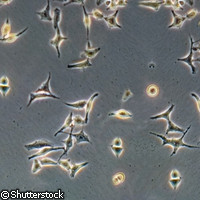MicroEnvimet: stopping cancer before it spreads
A new EU-funded network aims to take the fight against cancer to its environment. The MicroEnvimet ('Understanding and fighting metastasis by modulating the tumour microenvironment through interference with the protease network') project aims to increase our understanding of how cancers spread throughout the body and develop new ways to fight this process by altering the tumour's microenvironment. The project is coordinated by Professor Agnes Noel from the University of Liege, Belgium. It will run for four years and is receiving €2,999,689 in funding from the Health budget line of the EU's Seventh Framework Programme (FP7). Metastasis is currently considered as the most serious challenge for cancer treatment. It involves the spread of the disease either within the same organ or to other organs. Most tumours have the ability to metastasise. Meanwhile molecules called proteases are now recognised as key regulators of a complex network of interacting molecules that modulate the properties of cancer cells and their microenvironment. The purpose of MicroEnvimet therefore is to shed new light on the early mechanisms involved during the spread of a tumour through metastasis. The key to this will be studying precisely what is the contribution of the tumour's microenvironment during the various stages of its evolution. MicroEnvimet is proposing some innovative approaches for building a comprehensive understanding of the interplay between cancer cells and their microenvironment. It also aims to identify molecular targets which contribute to the early steps of the tumour progression. It hopes to identify which factors in the microenvironment constitute a 'fertile soil' for the establishment of metastases. All this will help them in their final goal of modifying the tumour's microenvironment, by interfering with the proteases which regulate the interactions between tumour cells and their cellular and molecular microenvironment. The investigation into the tumour microenvironment usually involves a multidisciplinary approach, and such is the case now. Nine universities, laboratories and institutes are combing their resources as part of this project. Between them, they have expertise in genomics, proteomics, bioinformatics, in vivo imaging, transgenic mice, mouse models of metastasis, genetic manipulation of transplantable tumour cells, computerised image analysis, virus-mediated gene transfer, phage display and production of neutralising antibodies. To assist their joint efforts, the MicroEnvimet partners will enjoy shared access to a new microRNA platform, innovative technologies, human tumour tissue banks, in vivo and in vitro models mimicking different steps of metastatic dissemination, as well as know-how in tumour-host cell interplay, angiogenesis, lymphangiogenesis, and cancer stem cell biology.



